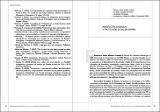Por favor, use este identificador para citar o enlazar a este item:
http://hdl.handle.net/10261/176977COMPARTIR / EXPORTAR:
 SHARE
BASE SHARE
BASE
|
|
| Visualizar otros formatos: MARC | Dublin Core | RDF | ORE | MODS | METS | DIDL | DATACITE | |

| Título: | Inmigración, diversidad y protección social en España |
Autor: | Moreno Fuentes, Francisco Javier CSIC ORCID ; Arriba, Ana; Moreno, Luis CSIC ORCID | Palabras clave: | Immigration Public policy Welfare State Spain Políticas públicas Estado de bienestar Inmigración |
Fecha de publicación: | 2006 | Citación: | Revista Española del Tercer Sector 4: 53-97 (2006) | Resumen: | [EN] The position of Spain in the international migration system has substantially changed in the last decade. The settlement of immigrant communities poses a series of important challenges to Spanish society. The social protection schemes included in the welfare state are considerably affected by the social, political, cultural and demographic transformations derived from this phenomenon. On the one hand these schemes must define the way to grant access to their services and benefits to the new residents (definition of the boundaries of entitlement to access the health care system, the social services, the education system or the housing policies). On the other hand, they need to articulate mechanisms to respond to the differential demands of a changing population (in terms of socio-demographic structure, cultural and linguistic profiles, as well as biological characteristics). The welfare state, in sum, is subject to a modification in the social perception of its legitimacy due to the increase of the internal social heterogeneity. In addition to posing a challenge, this phenomenon constitutes in itself a good opportunity to identify the weaker points of the social protection system, a necessary step to reinforce it and
to guarantee its future sustainability. [ES] La posición de España en el sistema internacional de migraciones se ha transformado sustancialmente en la última década. El asentamiento de colectivos de origen inmigrante ha planteado una serie de importantes retos a la sociedad española. Las políticas de protección social incluidas en el llamado estado de bienestar se encuentran entre los principales afectados por las transformaciones sociales, políticas, culturales y demográficas derivadas de dicho fenómeno. Deben definir, de una parte, el modo de incorporación de los nuevos residentes a sus servicios y prestaciones (delimitación de criterios de acceso al sistema sanitario, servicios sociales, sistema educativo o políticas de vivienda). De otra, confrontan la articulación de mecanismos de respuesta a las demandas de una población cambiante (tanto en términos de estructura socio-demográfica, como en perfiles culturales, lingüísticos e incluso biológicos). El sistema de protección social, en suma, está sujeto a una modificación en la percepción social de su legitimidad derivada del aumento de la heterogeneidad interna de la sociedad. Además de un reto, este fenómeno constituye una oportunidad de identificar los puntos débiles del sistema con objeto de reforzarlo y garantizar así su sostenibilidad futura. |
Descripción: | Con autorización de la revista para autores CSIC. | Versión del editor: | http://www.plataformatercersector.es/es/documentosdeinteres/documentos-de-relevancia-para-el-sector/revista-espa%C3%B1ola-del-tercer-sector | URI: | http://hdl.handle.net/10261/176977 | ISSN: | 1886-0400 |
| Aparece en las colecciones: | (CCHS-IPP) Artículos |
Ficheros en este ítem:
| Fichero | Descripción | Tamaño | Formato | |
|---|---|---|---|---|
| InmigraciónDiversidadProtecciónSocialEspaña.pdf | 144,73 kB | Adobe PDF |  Visualizar/Abrir |
CORE Recommender
Page view(s)
272
checked on 19-abr-2024
Download(s)
35
checked on 19-abr-2024
Google ScholarTM
Check
NOTA: Los ítems de Digital.CSIC están protegidos por copyright, con todos los derechos reservados, a menos que se indique lo contrario.
